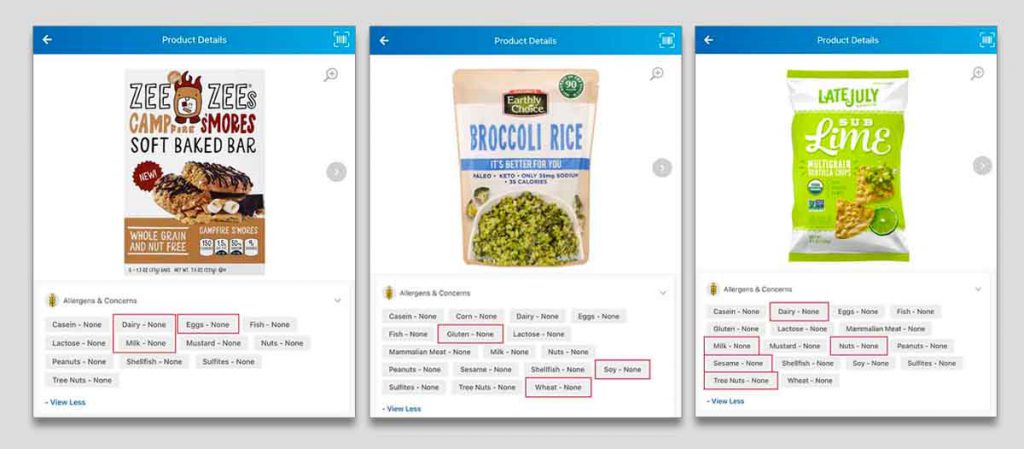Every consumer concerned with food allergies knows the drill: You do your best to read labels to determine whether the product you are considering is made on a line shared with your allergen of concern. If there’s no warning, you might take extra care to call the company because you know warnings like “May contain…” are voluntary and that some manufacturers include them, many don’t, and still others will warn for one allergen and not another.
Why do allergists urge you to avoid such products? Because they are made in facilities that process your allergen which poses a heightened risk of cross-contact, where the allergen is inadvertently introduced into a food product that shouldn’t contain it.
So when FARE endorses and co-brands a shopping app to help you find products to feed your child with food allergies, it must be trustworthy — taking the potential for cross-contact into account, right?
Unfortunately, no: the app will expose your family to products processed on the same lines as your allergens with no warning and little concern for your safety. FARE knows it and now you know too.
How this came to be illustrates what happens when a non-profit prioritizes revenue ahead of its core mission, which in this case is to serve the food allergy community. We’ll explain.
Back in November 2021, we learned of FARE’s plans to partner with a company called Sifter SPTM to market a food shopping app. In theory, you enter the allergens you want to avoid and the app will help you find products that meet your restrictions. But there’s a catch: the app doesn’t actually know how the products it recommends are manufactured other than what’s voluntarily listed on the label.
In our tests, we found numerous products that Sifter claimed had no allergen concerns when in fact they were made on the very same lines where those allergens are processed.
With these test results in hand, we approached Lisa Gable — FARE’s CEO at the time. She was concerned by the app’s omissions and assured us the organization would not promote Sifter until the company behind it fixed the problems we had raised.
Fast forward to November 10, 2022. On that day, FARE announced the launching of a co-branded version of the app. In their press release, FARE stated:
Food shopping is a major challenge for more than 85 million Americans with food allergies and intolerances. Now, using Sifter’s robust, science-based shopping platform, food-allergic individuals and families can make better food decisions and save hours of time when grocery shopping. In addition, the platform is accurate and easy to use, giving peace of mind to those with even the most restrictive dietary challenges.
What about FARE’s promise? Were the problems we identified indeed fixed?
No, nothing changed. It took us just minutes to retest the latest version of FARE’s now co-branded app to find three products that are made on the same lines as the allergens they are supposed to protect you and your family from. You can see our analysis by clicking here:
After FARE’s announcement of the partnership, we reached out to warn Dr Sung Poblete — FARE’s current CEO — of our findings. After listening to our concerns, she elected to proceed with the partnership anyway despite knowing the app would recommend products you would otherwise avoid if you were warned.
Instead, FARE issued another press release including this statement:
Based on FARE’s market research showing an overwhelmingly positive view of Sifter and strong support for recommending the Sifter product, FARE recently entered into a partnership with Sifter to recommend and raise awareness of the platform.
We can’t speak for their market research, but here’s a question we’re sure they didn’t ask: “Would you use this app if it suggested products made on the same lines as your allergens without warning you?“
We suspect the answer would be a resounding NO!
Why then would FARE — the leading non-profit in the food allergy space — choose to continue promoting such an app?
It all comes back to one motivating factor: money. Sifter has deep pockets and we surmise FARE would rather continue receiving revenue by promoting the app even though it recommends products the food allergy community would avoid if they were better informed.
So to summarize:
In our opinion, the organization has taken a wrong turn by prioritizing revenue ahead of the safety of food allergy sufferers.
Once again, we call on FARE’s management and board of directors to discontinue their promotion of the Sifter app and instead refocus their efforts on doing what they do best: advocating for the food allergy community rather than misleading it.
- Food Allergy Avoidance — ACAAI
- FARE and Sifter Announce Grocery Shopping Technology for the Food Allergy Community — FARE Press Release
- Statement of Sung Poblete, RN, PhD and CEO of FARE regarding FARE’s partnership with Sifter SP, Inc. — Fare Press Release
- Advisory: Do Not Use FARE’s Sifter Shopping App If Allergen Cross-Contact Concerns You — SnackSafely.com






